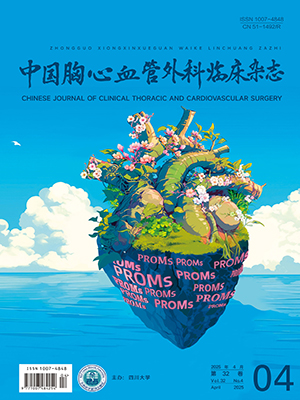| 1. |
Jenča D, Melenovský V, Stehlik J, et al. Heart failure after myocardial infarction: Incidence and predictors. ESC Heart Fail, 2021, 8(1): 222-237.
|
| 2. |
Liu Y, Pan J, Fan C, et al. Short-term exposure to ambient air pollution and mortality from myocardial infarction. J Am Coll Cardiol, 2021, 77(3): 271-281.
|
| 3. |
Bozkurt B, Fonarow GC, Goldberg LR, et al. Cardiac rehabilitation for patients with heart failure: JACC expert panel. J Am Coll Cardiol, 2021, 77(11): 1454-1469.
|
| 4. |
Heidenreich PA, Bozkurt B, Aguilar D, et al. 2022 AHA/ACC/HFSA guideline for the management of heart failure: A report of the American College of Cardiology/American Heart Association Joint Committee on Clinical Practice Guidelines. Circulation, 2022, 145(18): e895-e1032.
|
| 5. |
Doenst T, Haverich A, Serruys P, et al. PCI and CABG for treating stable coronary artery disease: JACC review topic of the week. J Am Coll Cardiol, 2019, 73(8): 964-976.
|
| 6. |
宫一宸, 凌云鹏, 张鲁锋, 等. 左胸小切口多支冠状动脉旁路移植术244例临床分析. 中华外科杂志, 2020, 58(5): 363-368.
|
| 7. |
Bonatti J, Wallner S, Crailsheim I, et al. Minimally invasive and robotic coronary artery bypass grafting: A 25-year review. J Thorac Dis, 2021, 13(3): 1922-1944.
|
| 8. |
Aggarwal M, Ornish D, Josephson R, et al. Closing gaps in lifestyle adherence for secondary prevention of coronary heart disease. Am J Cardiol, 2021, 145: 1-11.
|
| 9. |
Thomas RJ, Beatty AL, Beckie TM, et al. Home-based cardiac rehabilitation: A scientific statement from the American Association of Cardiovascular and Pulmonary Rehabilitation, the American Heart Association, and the American College of Cardiology. Circulation, 2019, 140(1): e69-e89.
|
| 10. |
Dun Y, Smith JR, Liu S, et al. High-intensity interval training in cardiac rehabilitation. Clin Geriatr Med, 2019, 35(4): 469-487.
|
| 11. |
Wu C, Bu R, Wang Y, et al. Rehabilitation effects of circuit resistance training in coronary heart disease patients: A systematic review and meta-analysis. Clin Cardiol, 2022, 45(8): 821-830.
|
| 12. |
Garbi M. National Institute for Health and Care Excellence clinical guidelines development principles and processes. Heart, 2021, 107(21): 949-953.
|
| 13. |
Jeong SW, Kim SH, Kang SH, et al. Mortality reduction with physical activity in patients with and without cardiovascular disease. Eur Heart J, 2019, 40(43): 3547-3555.
|
| 14. |
Doenst T, Diab M, Sponholz C, et al. The opportunities and limitations of minimally invasive cardiac surgery. Dtsch Arztebl Int, 2017, 114(46): 777-784.
|
| 15. |
Taylor RS, Dalal HM, McDonagh STJ. The role of cardiac rehabilitation in improving cardiovascular outcomes. Nat Rev Cardiol, 2022, 19(3): 180-194.
|
| 16. |
Gati S, Malhotra A, Sharma S. Exercise recommendations in patients with valvular heart disease. Heart, 2019, 105(2): 106-110.
|
| 17. |
Dibben G, Faulkner J, Oldridge N, et al. Exercise-based cardiac rehabilitation for coronary heart disease. Cochrane Database Syst Rev, 2021, 11(11): CD001800.
|
| 18. |
Blumenthal JA, Smith PJ, Jiang W, et al. Effect of exercise, escitalopram, or placebo on anxiety in patients with coronary heart disease: The understanding the benefits of exercise and escitalopram in anxious patients with coronary heart disease (UNWIND) randomized clinical trial. JAMA Psychiatry, 2021, 78(11): 1270-1278.
|
| 19. |
Peltzer S, Müller H, Köstler U, et al. Detection and treatment of mental disorders in patients with coronary heart disease (MenDis-CHD): A cross-sectional study. PLoS One, 2020, 15(12): e0243800.
|
| 20. |
Zanini M, Nery RM, de Lima JB, et al. Effects of different rehabilitation protocols in inpatient cardiac rehabilitation after coronary artery bypass graft surgery: A randomized clinical trial. J Cardiopulm Rehabil Prev, 2019, 39(6): E19-E25.
|
| 21. |
Snoek JA, Prescott EI, van der Velde AE, et al. Effectiveness of home-based mobile guided cardiac rehabilitation as alternative strategy for nonparticipation in clinic-based cardiac rehabilitation among elderly patients in Europe: A randomized clinical trial. JAMA Cardiol, 2021, 6(4): 463-468.
|
| 22. |
Khadanga S, Gaalema DE, Savage P, et al. Underutilization of cardiac rehabilitation in women: Barriers and solutions. J Cardiopulm Rehabil Prev, 2021, 41(4): 207-213.
|
| 23. |
Turk-Adawi K, Supervia M, Lopez-Jimenez F, et al. Women-only cardiac rehabilitation delivery around the world. Heart Lung Circ, 2021, 30(1): 135-143.
|
| 24. |
Mamataz T, Uddin J, Ibn Alam S, et al. Effects of cardiac rehabilitation in low-and middle-income countries: A systematic review and meta-analysis of randomised controlled trials. Prog Cardiovasc Dis, 2022, 70: 119-174.
|
| 25. |
Su JJ, Yu DS. Effects of a nurse-led eHealth cardiac rehabilitation programme on health outcomes of patients with coronary heart disease: A randomised controlled trial. Int J Nurs Stud, 2021, 122: 104040.
|




